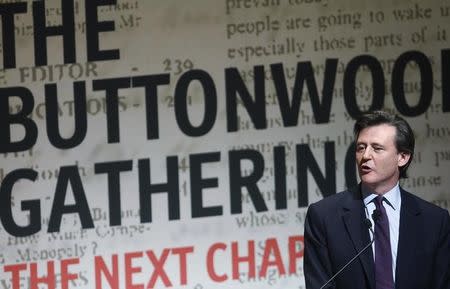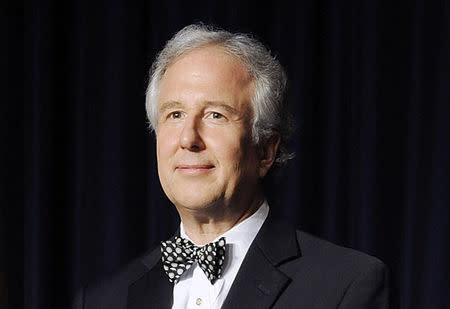Bloomberg News names Economist editor to replace Winkler
By Jennifer Saba and Paul Sandle NEW YORK/LONDON (Reuters) - Billionaire news and information mogul Michael Bloomberg replaced the founding editor at his eponymous news service with Economist Editor-in-chief John Micklethwait, moving aggressively to broaden the one-time financial newswire beyond its core Wall Street audience. Matthew Winkler, 59, the entrepreneurial and at times volatile leader of Bloomberg's newsroom for 25 years, is stepping aside to become editor-in-chief emeritus. The announcement on Tuesday marks the latest shakeup since Michael Bloomberg, who served as New York's mayor for three terms, said he would return to the helm of his company next year. "I have always believed that organizations benefit from internal change," Michael Bloomberg said in a memo to employees that was reviewed by Reuters. Micklethwait's arrival "will give us the chance to unify the editorial side of our company," from real-time news to its magazines and digital properties, Bloomberg said. Micklethwait, 52, will take over from Winkler in early 2015, Bloomberg LP said. Micklethwait has been with The Economist, which is half owned by Pearson's Financial Times media group, since 1987. While editor in chief, he has successfully steered the magazine through a tough period for print media as more content moves to the web and mobile phones, analysts said. Under his tenure, The Economist not only grew its print circulation globally, to around 1.5 million worldwide, but also built up 100,000 digital subscribers as well. "The Economist has come out with its reputation enhanced as a business that has understood how to manage that transition," said Douglas McCabe, a media analyst at Enders Analysis. Before launching Bloomberg News in 1990, Winkler was a reporter with the Wall Street Journal. He made such an impression on Michael Bloomberg while interviewing him for a story about the then-fledgling information service that Bloomberg recruited him to build the newsroom from scratch. Over the span of a quarter-century, the bow-tie wearing editor built one of the world's largest news organizations. He did so with a hands-on leadership approach that extended to personally reviewing headlines, interviewing nearly all new hires and enforcing Bloomberg's notably stringent newsroom style guide. "Congratulations to my friend and colleague John Micklethwait," Winkler said in a post on Twitter. "Excited to work with him and start a new chapter." In his new role, Winkler will work with Bloomberg on strategic efforts, the memo said. With 2,400 reporters and editors in more than 150 bureaus worldwide, Bloomberg News competes with Thomson Reuters Corp and News Corp's Dow Jones Newswires in providing financial news and information. Ken Doctor, a media analyst at Newsonomics, said the change is "all a piece of figuring out the next step of Bloomberg News as they attempt to make it a major consumer brand." Doctor noted the move follows the remake of its Businessweek magazine and the development of verticals like Bloomberg Politics. Other high-profile media executives have tried to broaden Bloomberg's horizons as a news organization over the years, from Time Inc editor Norman Pearlstine to former Atlantic Media head Justin Smith, who continues to be chief executive of Bloomberg Media Group. Pearlstine left last year to return to Time. Last year, Winkler was criticized over the decision not to publish an investigative report into the financial ties of China's wealthiest men. Under his tenure, Bloomberg LP also acknowledged that reporters had limited access to data about its clients' use of the organization's terminals, such as when a customer logged in or what functions they used. The company ended this practice and apologized. Michael Bloomberg's third term as New York City ended late last year. In September, he announced plans to return to the news organization, replacing Chief Executive Daniel Doctoroff. Neither Bloomberg nor Winkler were available for comment. (Additional reporting By Michele Gershberg, Dan Burns, Lewis Krauskopf in New York and Paul Sandle in London; Editing by Christian Plumb)



